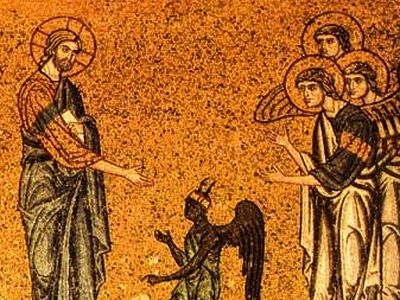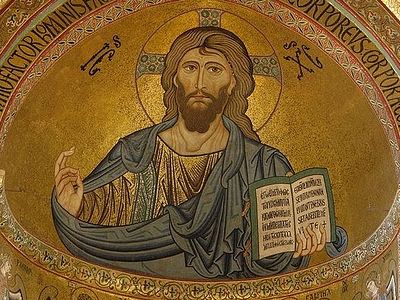From time to time, one hears questions from people who are afraid, because some foe has set out to harm them. People believe that their health, work, and personal problems are directly linked to this. They search for some kind of sacred action to resort to, in order to repel this attack of the dark forces.
People ask about some kind of icon or prayer that would set things straight. But you cannot set matters straight this way. The Church has no "white magic" to neutralize the "black". This is not the school of protection against the dark arts. The Church offers something altogether different. Yes, it offers protection as well, but not exactly that which people are looking for.
The spiritual forces of evil are real, and different kinds of magicians and sorcerers concern themselves precisely with this, but their goal is not at all to cause petty troubles to you at work and in personal life. They would willingly provide you a calm life with every good fortune and pleasure, if they could achieve the main task of destroying your soul, cutting it off from God.
All the earthly ills of this world are the result of sin, of defying the will of God; but this is a consequence, which for the forces of evil is incidental, even undesired. Their goal is to prevent you from starting on the path to salvation, or to divert you from this path if you already are already approaching it.
The forces of good—God, His saints and angels—do not seek to deliver you from petty troubles inflicted on you by demons, or to give you health and prospecty. Of course, a life in obedience to God's commandments, as a rule, will be more successful, peaceful, and safe, but that is not the primary goal.
The message proclaimed by the Church is much greater than anything of which we could dare to think. The Church proclaims that God wants to give you - you precisely - life eternal and blessed, because you are precious in His eyes and He loves you. He wants to bring you to His house and to make you a member of His family. As the Gospel says: But as many as received him, to them gave he power to become the sons of God, even to them that believe on his name: Which were born, not of blood, nor of the will of the flesh, nor of the will of man, but of God (Jn 1:12-13).
This message is too immense for us, who are accustomed to small pleasures and afflictions. We often do not hear it, do not understand it, and even hearing, we turn away from it, but it remains true.
Imagine a young beggar, homeless, asking for change from passersby. Now imagine that the king loved him, wanted to make him a member of the royal family and an heir, to bring him to the palace. He invites the homeless boy, but the latter does not really want to hear about adoption or the palace. He wants something a bit simpler. A couple of coins. A hamburger. A can of beer. Riddance of the other beggars who make competition for him. Or anything of this kind, that might improve his vagrant life a bit. But the king does not want to give him this. He really wants to take him to the palace—not to improve this life a little, but to give something different altogether.
Man often ends up in the position of this beggar, who wants to ask God for some small change. Something that will make his earthly life more comfortable, or at least more pleasant. But the Gospel is about something else.
"As many has have been baptized into Christ, have put on Christ," the Church sings during its great feasts. These are words from the Epistle of the Holy Apostle Paul to the Galatians: For ye are all the children of God by faith in Christ Jesus. For as many of you as have been baptized into Christ have put on Christ (Galatians 3:26-27). We are called to be children of God. This is not easy. The life of a vagrant can be difficult and bleak, it contains no discipline, obedience, or study, unlike the life of the crown prince. But God offers us precisely this: adoption by the Lord of the Universe.
And in order to accept His gift we should give to Him our hearts and entrust our lives to Him completely. It is not necessary to ask the question, "How do I make God solve my problems?" It is about something else: how to trust and submit to God, how to be rid of the tramp's deeply ingrained habit of lies, both voluntary and involuntary.
When we decide to submit to God, we see our problems altogether differently. Probably some of them will simply disappear, and others will become the lessons we should learn in the school of our Heavenly Father.
But this is our choice, and no one can force us to do it. Even God decided not to do this. He is always waiting for our voluntary consent. We can refuse, go away to the outer darkness, and remain there forever. The goal of the force of evil is this exactly—not just to create small troubles for us.
The goal upon which the Church was established is to lead us on the path to salvation.




